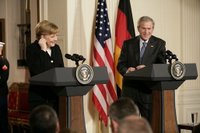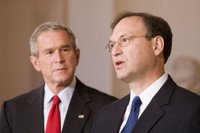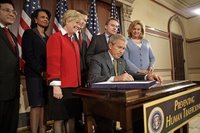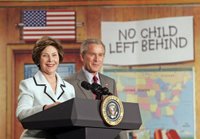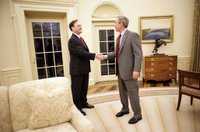President Welcomes German Chancellor Merkel to the White House FULL STREAMING VIDEO, The East Room 11:37 A.M. EST, In Focus: Global Diplomacy
PRESIDENT BUSH: Thank you, all. It's such an honor to welcome Chancellor Angela Merkel here to the White House. We just had a long visit. The first thing I did was ask everybody to leave the room, except for the Chancellor. And we talked about our philosophy and our hopes. We talked about our desire to work together to accomplish important goals for the world, starting with peace. We share a deep desire to help those who suffer. We care about the hungry and the sick.Germany is a valued ally. We've got a friendship that's important. We share common values based upon human rights and human decency and rule of law; freedom to worship and freedom to speak, freedom to write what you want to write.
We've got an important job ahead of us to work on key issues, like Iran. We spent some time talking about the Iranian issue and the desire to solve this issue diplomatically by working together.
We talked about the war on terror. I told the Chancellor that there's still an enemy that wants to do harm to the American people and others who like freedom; an enemy there that lurks, and that we've got to share information and share intelligence and work carefully to protect our peoples; that the threat is real; and that my obligation as the President of this country is to do everything in my power to protect the people, and we can't do it alone.
We talked about Eastern Europe and the Balkans. I thanked the Chancellor for Germany's contribution in Afghanistan. Afghanistan is a country that has gone from being ruled brutally by the Taliban, a group of people who have values the exact opposite of the values of Americans and the German people, to one that's now beginning to see the light of freedom. Democracy yields to peace and it's important that democracy succeed in Afghanistan, and I want to thank the German people and the German government for their contributions.
We talked about Iraq -- and we've had our disagreements on Iraq, obviously. It's been a difficult issue in our relationship and I fully understand that. But in spite of disagreements, we share the desire for the Iraqi people to live in freedom. I want to thank the German government for help with reconstruction.
We talked about Israel and Palestine. Both of us care deeply about the health of Ariel Sharon, Prime Minister Sharon. We wish him all the very best and hope for his recovery. We also care deeply about the plight of the people in that part of the world, and we hope that there will be two states living side-by-side in peace.
We talked about NATO as the foundation of our collective defense and consultations. We talked about the importance of trade relations and business relations and commerce so that people on both sides of the Atlantic in our respective countries can find meaningful, high-paying jobs.
We talked about a lot, and the reason we talked about a lot is because we've got a lot in common. And the reason we talked about a lot, because there's a lot of issues in the world that require our intense cooperation and desire to work together. And I appreciate the candid conversation, and I appreciate the beginning of what's going to be an important relationship for the sake of our respective peoples.
Welcome.
CHANCELLOR MERKEL: (As translated.) Well, thank you very much. And let me say that we, indeed, had a very open, a very candid discussion, one that was characterized by a spirit of trust that builds on a long tradition of German-American relations. But I think that will open up, also, a new chapter, as I hope, in our relationship.
This is my first visit as Chancellor, heading a new federal government. And I explained that there are two objectives that we have set out for ourselves. First of all, as regards our domestic agenda. We would like to strengthen our economic force, our economic strength. We look at the challenges that globalization entails, and we would like to explain to our people that in order to meet the social challenges ahead, we need to be economically strong.
And I think there is a lot of common ground here because we are at one in thinking that, obviously, we ought not to fall back into isolationist tendencies. We know that these tendencies are there, for example, in the European Union. We think we ought to meet these challenges of competition head-on. And I think what we need to do is we need to convince our people to believe in themselves and to believe that even in the face of the challenges of globalization, prosperity and social equality is possible.
Secondly, apart from the domestic component, Germany wants to be a reliable partner to our partners in the world, but also to our partners in Europe. And in order to be able to do that -- well, Europe, as you know is composed of smaller and larger nations. We talked about the European Union. We talked about the possibilities and the chances open to the European Union. And I think it's essential that those countries that feel that they share common ground as regard to values in the Western world stand together. And for Germany, I would like to say that throughout the period of the Cold War, the fact that for more than 40 years we believed in the value of freedom actually was the firm foundation for what was possible later on in a European unification.
The fact that your father's partnership and leadership, that was an incredible offer that was made to us by President Bush at the time. And I think that this is certainly in our vested interest to work together with you. What does that mean, "our vested interest"? It means that we face the challenges in the world today head-on. It means that after the threat through the Cold War is no longer with us. Obviously, the threat of terrorism is certainly the greatest challenge to our security in the 21st century.
There may sometimes be defenses as to the acuteness of the danger, as to what form it presents itself, how we actually also counteract here and how we face up to this. Afghanistan, for example, is a case in point. We are engaged and we're committed to Afghanistan because we see that as a vested interest. We think it is only in our interest that the whole of this region is stabilized. The same is for Iraq. Secure democratic structures ought to be in existence in Iran. This is in our vested interest. In spite of the fact that we don't have troops on the ground there, stability there is in our very own vested interest, and we've shown that through commitments that we've entered on in other areas.
On the Balkans, the Balkans, too, their stability is the only promising sign which can actually ensure stability for the whole of the region. And NATO, for me, is the forum where we need to discuss, where we need to debate strategic issues and what we think is necessary as regards further military capabilities.
We also openly addressed that there sometimes have been differences of opinion. I mentioned Guantanamo in this respect. But I think that at the end of the day, what counts is that we come back to the situation where we openly address all of the issues -- not only how we envisage the fight against terrorism, but I just mean a very broad-based debate, for example, on trade issues, how do we see our relationship with China, how do you see our relationship with Russia, what sort of strategic relationships do we want to forge as Western nations. And this is why I'm so happy about the fact that we were at one in saying we need to intensify our contacts further; we need to address all of these issues.
And I think a very successful chapter, for example, was opened over the past few days and weeks as regards Iran. To us Germans, too, it is totally unacceptable what Iran has said recently, for example, as regards the questioning the right of existence of Israel, the statements that were made with relevance to the Holocaust. And it's essential, we feel, that the EU3, together with the United States, take a common position here, become active, that we try to persuade as many other countries as possible to join themselves to us, to ally themselves with us, and we will certainly not be intimidated by a country such as Iran.
I must say that I was greatly encouraged by our meeting here today, Mr. President, and I hope and trust that we shall continue our very good discussions, that we will further intensify them. We have every opportunity, I think, to intensify our economic relations, our business relations, relations in the area of research and development, in foreign policy. And I'm very, very pleased that we made such a good start here today.
PRESIDENT BUSH: Terry.
Q Thank you, Mr. President. Chancellor Merkel has said that the U.S. prison camp at Guantanamo should not be kept open indefinitely. Are you willing to close it down anytime soon? And, Chancellor, what are your concerns about Guantanamo?
PRESIDENT BUSH: Yes, she brought up the subject, and I can understand why she brought it up, because there's some misperceptions about Guantanamo. First of all, I urge any journalist to go down there and look at how the folks that are being detained there are treated. These are people picked up off a battlefield who want to do harm. A lot of folks have been released from Guantanamo.
Like the Chancellor, I'd like to see a way forward there. The way forward, of course, is ultimately through a court system. I think the best way for the court system to proceed is through our military tribunals, which is now being adjudicated in our courts of law to determine whether or not this is appropriate path for a country that bases itself on rule of law, to adjudicate those held at Guantanamo.
The answer to your question is that Guantanamo is a necessary part of protecting the American people, and so long as the war on terror goes on, and so long as there's a threat, we will, inevitably need to hold people that would do ourselves harm in a system that -- in which people will be treated humanely, and in which, ultimately, there is going to be a end, which is a legal system. We're waiting for our own courts to determine how that's best to proceed.
CHANCELLOR MERKEL: (As translated.) Well, it is true that we addressed this issue openly, and I think it's, after all, only one facet in our overall fight against terrorism. I made it very clear and I completely share your assessment as regards the nature and dimension of this threat, and that the Federal Republic of Germany, just as other European countries, need to come up with convincing proposals as to how we ought to deal with detainees, for example, who do not feel bound by any law; and how do we deal with people who come from countries where such structures don't exist.
So I think what we need to address is how we further want to proceed. We need to, for example, find a reform of the international law in this respect, and I think the United Nations is, indeed, a good forum to do that. But I think that's part of a permanent dialogue between our two countries, where we really need to debate how we wish to proceed further. And the basis and the common ground needs to be we have shared values, and I have seen that this is a very best precondition, even though from time to time we may have differences of opinion here.
Q -- been discussed. Are you in favor of sanctions against Iran in the Security Council, and what kind of sanctions should that be? And another question is, in Germany, there's a discussion about intelligence, secret service people working in Baghdad during the Iraq war. From your knowledge, did the German intelligence help the U.S. before and during the Iraq war in Baghdad?
PRESIDENT BUSH: I have no idea about the latter. (Laughter.) You did say, secret intelligence, right? (Laughter.) I understand. I really -- the truth of the matter is, the Chancellor brought this up this morning. I had no idea what she was talking about. The first I heard of it was this morning, truthfully.
Secondly, the first part of your question was Iran.
Q Iran, sir.
PRESIDENT BUSH: Okay, good. Sometimes when you mix them up, it throws us off balance, you know?
I'm not going to prejudge what the United Nations Security Council should do. But I recognize that it's logical that a country which has rejected diplomatic entreaties be sent to the United Nations Security Council. I want to put it in this perspective: The U.N. Security Council is part of the diplomatic process, started by Germany, France, and Great Britain representing the interests of a lot of countries like ourself, which made it abundantly clear to the Iranians that the development of the know-how and our -- a nuclear weapon was unacceptable. And the reason it's unacceptable is because Iran, armed with a nuclear weapon, poses a grave threat to the security of the world.
And countries such as ours have an obligation to step up working together, sending a common message to the Iranians that it's their behavior -- trying to clandestinely develop a nuclear weapon, or using the guise of a civilian nuclear weapon program to get the know-how to develop a nuclear weapon is unacceptable. And Germany has played an incredibly constructive role in this dialogue. And I want to thank the Chancellor for continuing that dialogue.
As I say we're working very carefully together in consultation about how to proceed next. One of the things friends do is they spend time discussing strategies before we make a common statement about what next ought to happen. And we spent a fair amount of time today, and I know Condi Rice has spent a fair amount of time with the current government about strategizing how best to achieve the objective. That's what we want to do. We want an end result to be acceptable, which will yield peace, which is that the Iranians not have a nuclear weapon in which to blackmail and/or threaten the world.
I want to remind you that the current President of Iran has announced that the destruction of Israel is an important part of their agenda. And that's unacceptable. And the development of a nuclear weapon seems like to me would make them a step closer to achieving that objective. And we have an obligation in order to keep the peace to work together to achieve the objective that we're trying to achieve through the current diplomatic process.
I don't know if you want to add to that brilliance or not. (Laughter.)
Steve.
Q Thank you, sir. If I could just follow up on that. China's U.N. Ambassador says referring Iran to the Security Council might complicate the issue. How hard is it going to be to get a --
PRESIDENT BUSH: Say that again, Steve. I'm getting a little old. I'm getting old; I'm having trouble hearing.
Q China's U.N. Ambassador --
PRESIDENT BUSH: The Chinese Ambassador said what?
Q It might complicate the issue if you refer Iran to --
PRESIDENT BUSH: Might complicate the issue?
Q Yes, sir -- of how hard it's going to be -- what's your timetable? Should the sanctions include the threat of military force?
PRESIDENT BUSH: First of all, I want to repeat what I said before. We should not prejudge the strategy in the Security Council until they get to the Security Council. What we're doing now is beginning to lay out the strategy of what happens in the Security Council. That's what friends do. We consult, we talk, we strategize as to how to achieve an important objective, which is not allowing an -- for Iran not to have a nuclear weapon.
And you're going to see a lot of public discussion about this matter. And the Chinese, you know, have got an opinion, the Russians have an opinion, we have opinions, everybody has opinions. Our job is to form a common consensus. And so you're -- this is what's called diplomacy. I know you know that, Steve. I don't mean to insult you. But diplomacy is out talking to friends, allies, and others about a common objective. This meeting has got a lot of diplomacy in it today, because this is a subject in which we've spent a lot of time. I'm very interested in the Chancellor's opinion on this subject.
We did talk about the Chinese statement. Our job is to make it clear to all parties that it is in the world's interest that Iran not have a nuclear weapon. In other words, share the same goal. Once that goal is established, it makes it easier to come up with the strategy to achieve the goal.
And so, of course, we'll reach out to the Chinese and remind them, once again, that it's not in their interest or the world's interest for the Iranians to develop the capacity to -- and/or a nuclear -- to build a weapon and/or to possess a weapon. And I just gave you one reason why.
Another reason why is it's very important for non-transparent societies not to have the capacity to blackmail free societies. We're thinking about how to lay the foundation for peace. We must be proactive. And that's what you're seeing. You're seeing the evolution of a proactive diplomatic policy --
Q What about --
THE PRESIDENT: Military option?
CHANCELLOR MERKEL: (As translated.) Allow me, if I may, and give you my German perspective on the matter. What is essential and is crucial is that over the next -- when we look at the next step to be taken by the EU3 and the United States together in a genuine consultation process that where we say at one point in time, we actually did everything we could. They refused it -- Iran refused every offer we made, even the Russian offer. Now we refer this matter back to the Board of Governors of the IAEA. But they, too, do their utmost to try to enlist as large a number of member states to join in on a proposal that will then be made to the Iranians. And I think this is going to be absolutely crucial for the Iranians to see how serious we are about all of this.
So what is at stake now is what sort of attempt and serious attempt is taken by all of us. And we've seen it with Syria, that it does leave an impression, it does leave an impact, if as large a number of nations in this world as possible makes it abundantly clear we are not accepting a stance that says, in effect, the right of existence of Israel is questioned, you are trying to lie to us, you are trying to cheat. This is something that we don't accept. And this is what we need to discuss: who is going to take which role, who is going to play which part, and what will be the final proposal. And then I think this has -- it was what made this EU3 approach so successful. They stood together and they had one uniform position.
Thank you.
Q (As translated.) A question addressed to you, Madam Chancellor, and then one to you, Mr. President. Chancellor, would you say that this visit today has opened up a new chapter in German-American relations? And how do you think this should look? (In English) -- better than with Chancellor Schr der at the last year? (Laughter.)
CHANCELLOR MERKEL: (As translated.) Well, for my part, I can say that there is every opportunity for us to further enhance our relations, and such enhancement of relations is founded on a shared experience, no doubt about this. Afghanistan was mentioned here, the Balkans were mentioned. And here, too, we're also able to tell you that, after all, we have been successful in WTO negotiations.
So what is important to me, I think, is to have as many international contacts as possible, because I think, to a very large part, misunderstandings occur when you don't meet often enough, when you don't talk to each other often enough. The President just pointed out how much intellectual effort has to go further into trying to come up with a convincing strategy as how to deal with Iran and we can't resort to some kind of ivory tower and think for ourselves. We have to do it in exchange with others.
Secondly -- and I do see a chance here, a climate of openness has to exist, an area where one says quite clearly and candidly to one another, well, there we agree, there we disagree. But there also has to be a climate of absolute trust, of reliability, where one stands by what one has agreed upon.
Thirdly, in spite of the great threat of terrorism that is the great threat to us in the 21st century, we need to point out that U.S.-Germany relations cannot only rest on fighting terrorism, but we have common interests. We have, for example, competitors, such as China and other countries, who don't abide by any rule. And we would like to see the rules kept. And now we need to find a common basis, a common approach, even though we sometimes may be ourselves competitors in certain business fields, for example, where we vie for orders.
So I see opportunities and I think that we need to be aware of the fact that after the end of the Cold War, many of the contacts that existed in the past and also because of our cooperation as allies, that these cannot be taken for granted these days anymore. So it's going to be essential for us not to only talk at governmental level -- it's a good experience, obviously -- but that also our scientists have to be engaged, that they have to understand that we need their contribution, too, to have good relations. And I think I made a little start in the right direction. So in about six months you may ask me again whether I've been able to add a few more chapters to it.
PRESIDENT BUSH: We've got something in common, we both didn't exactly landslide our way into office. (Laughter.)
I'm convinced that we will have a really important and good relationship.
First, I do want to send my best regards to Gerhard Schröeder. We spent a lot of time together, and we talked about issues. Listen, there was room for agreement and room for disagreement. And I do hope he's doing well.
Our job now is to work together. We've got big interests. Germany is a really important country. It's right in the heart of Europe; it's vital that Germany take the lead on a lot of issues. And I look forward to working with the Chancellor on common objectives. And my first impressions, with 45 minutes alone in the Oval Office, were incredibly positive. She's smart -- (laughter) -- she's plenty capable. She's got kind of a spirit to her that is appealing. She loves freedom.
I was particularly touched by hearing about her early life in communist Germany. There's something uplifting to talk to somebody who knows the difference between just talking about tyranny and living in freedom and actually done it.
So we're going to have a very good relationship. And that's important for our respective people. I'm looking forward to consultations, visits, contacts, phone calls, all the things you do. And now I'm going to take her to lunch. (Laughter.)
Thank you.
CHANCELLOR MERKEL: Thank you.
END 12:04 P.M. EST, For Immediate Release, Office of the Press Secretary, January 13, 2006
more at President Bush and German Chancellor Merkel or Angela Merkel and Germany and Merkel and NATO or German
Related: Keyword Germany, Friday, February 04, 2005 Condoleezza Rice Tony Blair Jack Straw Gerhard Schroeder, Saturday, February 05, 2005 Secretary Rice Europe and the Middle East, Wednesday, February 23, 2005 Bush Schröder Exchange Toasts, Wednesday, March 02, 2005 Sale of U.S. Military Equipment from Germany to Greece, Tuesday, March 08, 2005 Nazi Medical Experiments, Friday, March 18, 2005 GERMANY PARTNERS WITH IRAQ, UNITED ARAB EMIRATES FOR TRAINING, Sunday, May 08, 2005 President Honors and Commemorates Veterans in the Netherlands, Friday, May 20, 2005 President to Welcome German Chancellor Schroeder, Tuesday, May 24, 2005 pseudoneglect phenomenon, Monday, June 27, 2005 President Welcomes German Chancellor, Thursday, July 21, 2005 William Robert Timken, Jr Ambassador to Germany, Tuesday, September 20, 2005 Simon Wiesenthal - A Short Biography, Thursday, October 06, 2005 German-American Day, 2005,Thursday, December 01, 2005, President Bush to Welcome German Chancellor Merkel, Tuesday, December 21, 2004 President to Germany, Slovak Republic,





